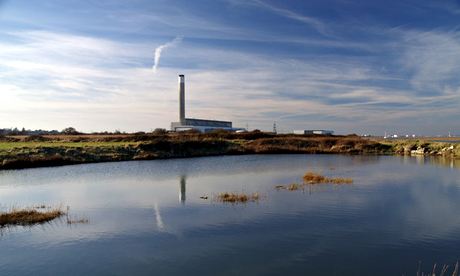
School day trips, growing up in the 1990s in Southampton, usually entailed being taken to anywhere nearby that was green enough, most often the New Forest. One trip, just on the forest's edge, was by a long measure the most memorable. Fawley power station is an oil-fired power station perched just at the edge of Southampton Water, next to the equally vast Esso oil refinery. Being taken around and inside it was utterly, overwhelmingly fascinating – a trip to somewhere completely alien, terrifying and (obviously) powerful, and at the same time entirely ordinary.
On hearing that attempts to have the administration building listed by English Heritage – a year after it was closed as a power station – have just failed, and that demolition is almost inevitable, it was hard not to have mixed feelings. It was undoubtedly polluting, and was surely having a deleterious effect on any attempt to bring down carbon emissions. It was a bad thing. But being taken around there, seeing it and having it explained, was genuinely educational, in the best sense. This is where electricity comes from. Isn't it wonderful?
It is most definitely not in keeping with the New Forest, though it makes an imposing ensemble with the tower blocks of Weston Shore on the other side of the water and the oil refinery adjacent. Looking at photographs of it today, I can see it's actually a very complex piece of architecture, with its glazed upper level faceted and angular, and the administration building a rotunda on a walkway with a dramatically futuristic interior, but I didn't notice much of this when I was 10.
The three things I do remember are, first, the monolithic presence of the main building, much bigger than anything I had previously been anywhere near, impossibly vast, on what felt like a Cape Canaveral scale. Second, the noise of it, the rumble and drone that it constantly gave off, a noise that you could feel in your bones. And third, what went on inside, being shown the hall, the generators, the control rooms, having explained how the oil came in, how it was burned, and how that was all transmitted through the pylons and cables of the National Grid to the towns and villages of the south coast.
Even at the time, I had mixed feelings – as an earnest prepubescent I was deeply worried about all the bad things happening to the world and nature and even had a (not very long-term) membership of Friends of the Earth. I was aware that National Power, through its use of nuclear energy, was very much the enemy, but when doing the write-up of the experience that everyone in the class had to do, I skirted guiltily over that and wrote about how amazing it all was. It's hard not to do quite the same now.
It wasn't the mere fact that this power station used noisy, smelly fossil fuels that made it so interesting; I suspect a similar, if perhaps a little less overpowering and monolithic experience could be had around windfarms and the buildings that serve them. They're equally fascinating and strange, equally peculiar in their relation to the landscape around, and visiting them, as child or adult, would have the same basic virtue – informing and showing you where things come from, always useful and instructive in a society that likes to imagine that its fuels, technologies and commodities appear as if by magic.
Unlike Battersea or Bankside, Fawley is too suburban, odd and huge to ever become useful for something economically gainful today – property development, art museums. The aesthetic revulsion against wind turbines and oil-fired power stations, or the closure and redevelopment of the sufficiently iconic coal-fired stations, come from a similar impulse – not wanting to know where it all comes from, how it all happens. Magic is less uncomfortable than electricity.

